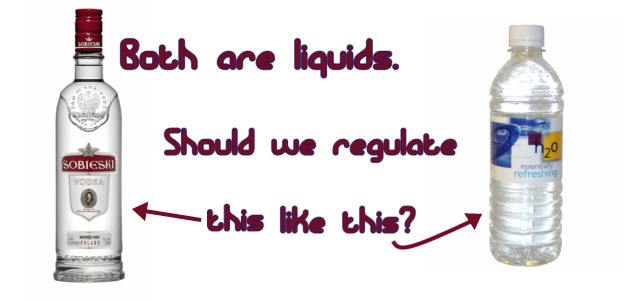Featured
Should We Regulate Water Like Alcohol Because They’re Both Liquids?
Regulating homeopathic remedies like pharmaceuticals because they’re both medicines would be like regulating water the same way as alcohol, since they’re both liquids.
 Homeopathic remedies are on the verge of being regulated in the same manner as pharmaceuticals in the UK. The reason being used is that they’re both medicines, so they should both be treated in the same manner.
Homeopathic remedies are on the verge of being regulated in the same manner as pharmaceuticals in the UK. The reason being used is that they’re both medicines, so they should both be treated in the same manner.
So why isn’t water regulated in the same manner as alcohol? They’re both liquids and they’re both clear.
This is how daft the law is becoming! Classifying two things the same way is now justification for regulating them the same way. The only similarities between pharmaceuticals and homeopathic remedies is their classification:
- Pharmaceuticals are known killers. No claim has ever been made that a homeopathic remedy has even done harm, let alone killed someone.
- Pharmaceuticals are used to suppress symptoms. Homeopathic remedies are used to trigger the body’s ability to heal itself.
- Taking too many pharmaceuticals invariably results in an overdose that can kill. You can’t take too much of a homeopathic remedy.
So what is the reason behind the UK government’s current idiocy in regulating homeopathic remedies as if they were the same thing as pharmaceutical drugs? It is an abrogation of people’s right to access the kind of health care they choose. It is in conflict with the government’s statements that the people’s right to access their chosen health care methods should be respected.
There is no legitimate reason to regulate homeopathic remedies in the same manner as pharmaceutical drugs. They do not pose the danger that pharmaceuticals do, so there is no need to protect the public from them. Whether they work or not is debated. However, homeopathy devotees state unequivocally that it heals them. If people wish to avail themselves of homeopathic treatment, by what legitimate reason the government deny them their wish?
Is it necessary to prove that prayer works before we allow people to pray? Of course not! It’s an absurd suggestion.
It’s equally absurd to regulate something both harmless and necessary in the application of a health modality that millions of people utilize. Simply because homeopathic remedies have been placed in the same classification as pharmaceuticals is not a valid reason for regulating them in the same manner.
Nuclear power and matches are both forms of energy. Should they be regulated in the same way?
Act to Save Your Right to Homeopathy Before It’s Too Late!
 The government plans to consolidate laws relating to medicine into a single act, the Medicines Act 2012. The current plan is to copy Section 10 of the Medicines Act 1968 into the 2012 act. That section would regulate homeopathic remedies in the same manner as pharmaceutical drugs.
The government plans to consolidate laws relating to medicine into a single act, the Medicines Act 2012. The current plan is to copy Section 10 of the Medicines Act 1968 into the 2012 act. That section would regulate homeopathic remedies in the same manner as pharmaceutical drugs.
This would result in the loss of most homeopathic remedies to most people in the UK. For more information on this, please see Back Door Attack on Homeopathy: Speak Out Now, Or Lose Your Freedom.
If you’re interested in background information on why this is happening, read Legislation Affecting UK Homeopathy on Homeopathy Heals Me.
Please, write to your Member of Parliament to tell them that you want your access to homeopathic services and medicines to continue as they have for well over a hundred years.
Homeopathic medicines should not be regulated in the same way as pharmaceutical drugs. They are not comparable and should not be treated as if they are.
How to Contact Your MP
It’s not difficult. Even if you don’t know who your MP is, here’s all the information you need to produce a message and send it to the right place:
- To send an e-mail, go to the Write to Them website. Just follow the instructions. It will help even if you don’t know your post code!
- To send a letter, mail it to:(Your MP’s Name)
The House of Commons
Westminster
London SW1A 0AA - You can obtain your MP’s name and direct contact details by dialing the House of Commons Information Office at 020 7219 4272 or go to the website Find Your MP.
Tagged govern attack on homeopathy, homeopathic remedies, homeopathy law, medicines act 1968, medicines act 2012, pharmaceutical drugs, pharmaceuticals, politics, regulating homeopathic medications, regulating homeopathic remedies
















Pingback: Regulating two different products in the same manner makes no sense « homeopathiccures
Pingback: Regulating two different products in the same manner makes no sense | Homeopathy for the Family
Pingback: Regulating two different products in the same manner makes no sense | Accesshealing's Blog